


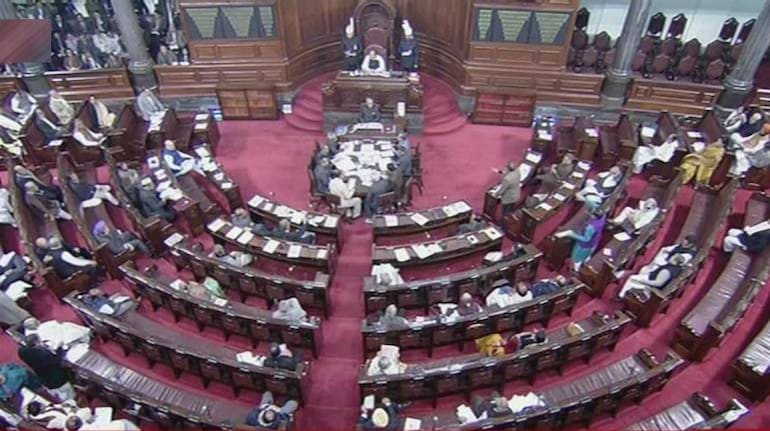
The Bharatiya Janata Party (BJP) and its allies bagged extra seats in last week’s Rajya Sabha polls in Maharashtra, Haryana, and Karnataka.
The BJP’s win is being attributed to the support it received from independents, cross-voting and the benefits it could reap from an internal crisis in rival parties
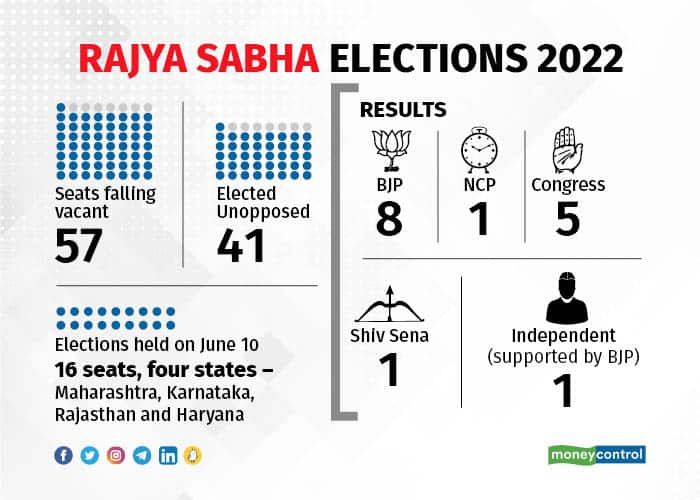
Of the 16 Rajya Sabha seats for which the voting was held on June 10, the BJP won eight and the Congress five. The Nationalist Congress Party (NCP) and Shiv Sena got one seat each while the JJP-BJP-backed media baron Kartikeya Sharma won one seat.
The results are a boost to the ruling party, especially ahead of the Presidential election next month and the 2024 general elections.
READ| Rajya Sabha Polls : Results a shot in the arm for BJP, Rajasthan win bittersweet for Congress
The BJP-led National Democratic Alliance (NDA) is short of the required majority mark in the Rajya Sabha and thus relies on support from allies such as the All India Anna Dravida Munnetra Kazhagam (AIADMK) and friendly parties including the Biju Janata Dal (BJD)and YSR Congress Party (YSRCP), apart from independents and smaller parties, for electing the next President of India.
Since 41 candidates, in the 57 vacancies, were already declared elected unopposed, elections to the remaining 16 seats were held. Now, the BJP’s Rajya Sabha strength, including the independent, is 95. Of the 57 vacancies, of which 24 were from the BJP, the party has reclaimed 23 seats, including one independent member that it supported.
The voting process
Members of Lok Sabha, the Lower House of Parliament, are chosen through elections by voters. Members of Rajya Sabha, the Upper House of the Parliament, are chosen through indirect elections — voting by elected members of legislative assemblies as prescribed in Article 80(4) of the Constitution.
The voting is held through the proportional representation system with the single transferable vote. This means each MLA’s vote is counted only once. MLAs list the different candidates in order of preference from 1 to 10. If 10 or more members choose a candidate as their first choice, he or she is elected.
After a candidate gets the required votes, the surplus votes are transferred to the next candidate, but with a diminished value and so on.
Small parties supported BJP in Maharashtra
In Maharashtra, the BJP managed to wrest an additional seat from the ruling Maha Vikas Aghadi (MVA) by getting the support of independents and smaller parties.
Also, read | Rajya Sabha election results will influence political events till 2024
Seven candidates were in the fray for six seats here.
For the five seats, the results went on expected lines. Union Minister Piyush Goyal, and Anil Bonde of the BJP. Praful Patel of the NCP, Imran Pratapgarhi of the Congress and Sanjay Raut of Shiv Sene won, as expected.
The interesting fight, however, was for the sixth seat – between Shiv Sena's Sanjay Pawar and BJP's Dhananjay Mahadik. BJP’s Dhananjay Mahadik won as the saffron party mustered the required numbers with the help of smaller parties and independents despite being in the Opposition.
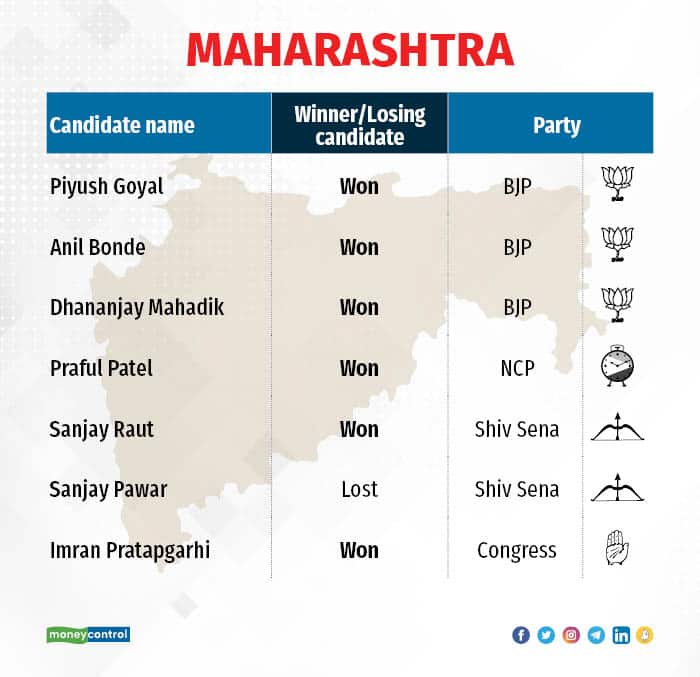
With each candidate requiring 41 votes to win in Maharashtra, the ruling alliance had to have 164 votes to get its four candidates elected
Shiv Sena MLA Suhas Kande’s vote was declared invalid and NCP MLAs Anil Deshmukh and Nawab Malik were not being allowed to vote as they were in jail. MVA had a total of 152 votes — 53 of the NCP, 55 of the NCP and 44 of the Congress.
The ruling alliance thus required 12 additional votes from 29 smaller parties and independents to send its fourth candidate Pawar to the Rajya Sabha. However, BJP managed to get votes from 17 of the 29 legislators from smaller outfits and independents for its third candidate Mahadik.
“Rajya Sabha was just a trailer. Wait and watch what we do next,” former chief minister and Leader of Opposition Devendra Fadnavis said after the party’s victory. Fadnavis is believed to be behind party’s decision to field the third candidate, thus making the contest interesting.
Cross-voting in Haryana and Rajasthan
In the two seats of Haryana ruling BJP’s Krishan Panwar won on expected lines. But the fight for second seat turned out to be a thriller with Congress’s candidate Ajay Maken losing despite his party’s adequate numbers. Maken was defeated by an independent candidate backed by the BJP and its ally Jannayak Janta Party (JJP), Kartikeya Sharma, with a margin as less as 2/3rd of a vote. The combination of first and second preference votes made Sharma victorious.
Also, read | 'Resort politics’ returns ahead of crucial Rajya Sabha elections on June 10
With one vote declared invalid and one MLA abstaining, the total number of votes in the 90-member assembly came down to 88. Poll officials said that BJP’s Panwar needed 30 votes to win and his six-plus votes were transferred to Sharma who eventually defeated Maken. Maken did not get any second preference votes and lost the election.

What made matters worse for Maken was that Congress MLA Kuldeep Bishnoi who cross-voted and faced suspension, and another MLA Kiran Choudhry cast her ballot “ wrongly”.
The only solace for Congress was from Rajasthan where all its three candidates — Randeep Singh Surjewala, Mukul Wasnik, and Pramod Tiwari — elected. BJP veteran Ghanshyam Tiwari was also elected to the Upper House from Rajasthan while BJP-backed media baron Subhash Chandra who contested as an independent and lost.
Despite tough competing for the third seat, Rajasthan chief minister Ashok Gehlot ensured all 126 MLAs, including 18 smaller parties and independents, voted for Congress candidates, including Tiwari who was up against Chandra.
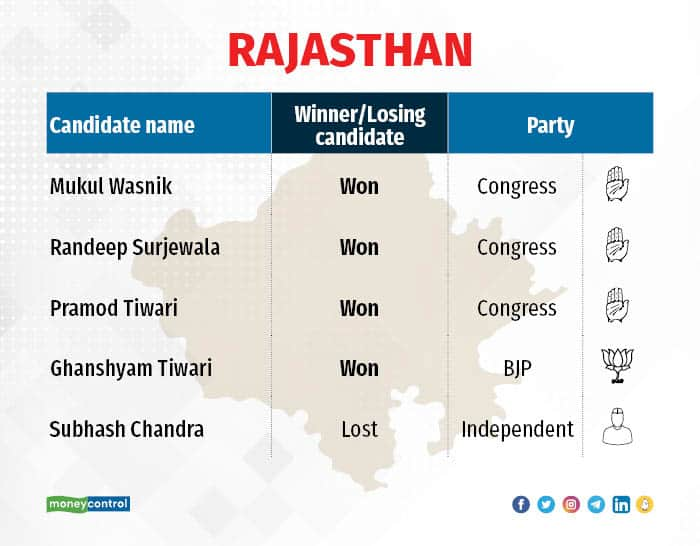
BJP MLA from Dholpur, Shobharani Kushwah, who cross-voted in favour of a Congress candidate, was suspended.
JD (S) draws a blank in Karnataka
In Karnataka, BJP candidates— Union Minister Nirmala Sitharaman, actor-turned-politician Jaggesh and member of legislative council Lehar Singh Siroya — won three out of four seats. Congress's Jairam Ramesh won the fourth seat.
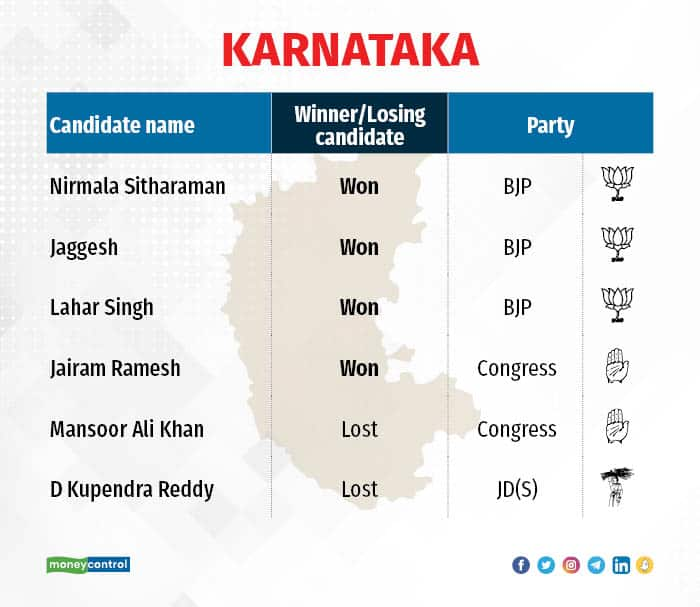
Former Prime Minister HD Deve Gowda's Janata Dal (Secular) could not win a seat in the Rajya Sabha election from its home state Karnataka.
Two berths for BJP had been expected but the party’s third candidate Lehar Singh Siroya managed to win because of cross-voting by a JD(S) MLA and an independent lawmaker. Siroya was against Mansoor Ali Khan of the Congress and the JD(S) candidate D Kupendra Reddy. None of the three parties had the required votes to win the fourth seat.
Also, read | Explained: How is the President of India elected?
In the BJP-rules state, a candidate needed the support of at least 45 MLAs to make it to the Upper House. Thus, based on the strength in the assembly, the BJP would have won two seats and the Congress one. However, the cross-voting helped BJP win the third seat.
"We were already winning two seats in Karnataka easily. But we got one more seat as a bonus. I would like to thank everyone for this," BJP National general secretary CT Ravi said on June 10 evening.
Discover the latest Business News, Sensex, and Nifty updates. Obtain Personal Finance insights, tax queries, and expert opinions on Moneycontrol or download the Moneycontrol App to stay updated!
Find the best of Al News in one place, specially curated for you every weekend.
Stay on top of the latest tech trends and biggest startup news.